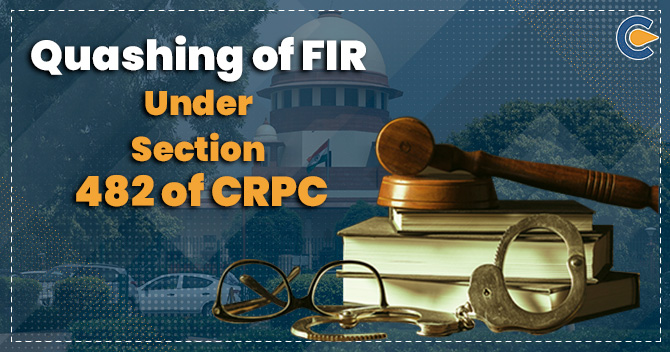Introduction
Merriam Webster dictionary defines quashes as to nullify especially by judicial action or to extinguish summarily and complete. In simple terms, the quashing of cases would mean the abandonment of the legal system that had begun to operate. The section does not confer any new powers on the High Court. It only saves such inherent powers which the court possessed before the enactment of the Code. Quashing under section 482 is usually done after a First Information Report (F.I.R), before or after filing of the charge sheet or before declaration of judgment. The section envisages three circumstances in which the inherent jurisdiction be exercised, namely:
- to give effect to an order under the code.
- to prevent abuse of the process of the Court; and
- to otherwise secure the ends of justice.
It is not possible, desirable or expedient to lay down any inflexible rule which would govern the exercise of the High Court’s inherent jurisdiction. The jurisdiction of of the High Court is confined to the Courts subordinate to it in the State for which the High Court has been constituted.
Background of Section 482
This section reproduces Section 561-A of the 1898 Code without any change. The language of Section 482, C.r.P.C. is exactly the same which was the language of Section 561-A, C.r.P.C. No legislative enactment dealing with procedure can provide for all cases that may possibly arise. The courts must, therefore, have inherent powers, apart from the express provisions of law, which are necessary for their existence and for the proper discharge of the duties imposed upon them by law. That is the doctrine which finds expression in this section, which merely recognizes and preserves the inherent powers of the High Courts. The inherent power in the High Court is an inalienable attribute of the position it holds with respect to the courts subordinate to it. These powers are partly administrative and partly judicial. They are necessarily judicial when they are exercisable with respect to a judicial order and for securing the ends of justice. When one speaks of “ends of justice”, the expression is not used to compromise within it any vague or nebulous concept of justice, nor even justice in the philosophical sense, but justice according to law, to statute law and the common law.
Inherent Jurisdiction
The inherent jurisdiction of the High Court preserved under this section is vested in it by “law” within the meaning of Article 21 of the Constitution of India. The procedure for invoking the inherent powers may be regulated by rules which may have been or be framed by the High Courts. The power to make such rules is conferred on the High Court by the Constitution. Where the rules were previously framed, they are continued in force by the Article 372 of the Constitution. A Session Judge has not been conferred inherent powers either under Section 482 or under any other law.
Discretion of Court
While exercising powers under Section 482, C.r.P.C., the Court does not function as a Court of appeal or revision. It also would not enter into the appreciation of evidence as such. Inherent powers are to be sparingly exercised for compelling reasons, when there has been any abuse of the process of law or any glaring injustice. It has to be further exercised only in the ends of justice. The power of the High Court under this section is indeed very wide. But that can only be exercised in cases where there is such a palpable want of jurisdiction in the proceedings initiated, as would result in unnecessary harassment and oppression to the accused concerned. This section cannot normally be invoked to supplant the normal process and enquiries by tribunals prescribed in the Criminal Procedure Code. It is not proper to exercise the extra ordinary powers under this section when another appropriate remedy is provided by the Code.
Relief will not be granted to a party whose hands are dirty with crime and misadventure. Before reaching a conclusion as to whether relief should be granted under Section 482, the High Court should hear the parties. To quash proceedings on a point raised by the affected party is not justified. The High Court is not given, nor did it ever possess, an unrestricted and undefined power to make any order which it might please to consider, was in the interests of justice. Its inherent powers are as much controlled by principle and precedent as are its express powers by statute. Assuming that the High Court has inherent power to review under Section 482 that power is to be sparingly exercised and only in a given situation where specific need is reflected as provided for in Section 482.
Relevant case laws
In the landmark case State of Haryana v. Bhajan Lal, a two-judge bench of the Supreme Court of India considered in detail, the provisions of section 482 and the power of the High Court to quash criminal proceedings or FIR. The High Court summed up the legal position by setting out the following guidelines to be followed by the High Court in exercising its jurisdiction over criminal proceedings:
- Where allegations are made in a preliminary information report or complaint, even if they are considered to be their own and accepted by them all they do not include the case or present the case to the defendant.
- Where allegations contained in preliminary information and other matter, if any, related to F.I.R. do not disclose a material offense, they excuse the police investigation under section 156 (1) of the Code without the Magistrate’s direction within the incident. of Section 155 (2) of the Code.
- Where allegations are made against the F.I.R. or a complaint and evidence gathered in support of the same do not disclose the commission of any case and commit a criminal offense.
- Where the allegations in the F.I.R. are not a literal case but are the only unspecified case, no investigation is allowed by the police without the Magistrate’s order as contemplated under section 155 (2) of the Code.
- Where allegations made to the F.I.R. or a complaint is unreasonable and unreasonable on the basis of that, no reasonable person may conclude that there is sufficient reason to proceed with the charge.
- Where there is a direct legal line built into any provision of the Code or the Act concerned (in the case of a criminal case) in the institution and proceedings and / or, where there is a provision in the Code or applicable law, which provides for the redress of the deceased’s complaint.
- Where a criminal offense exists it is usually attended to by a mala fide and / or where the proceedings are deliberately initiated with the grievous cause of retaliation against the defendant and with the intention of disputing him or her for personal and personal disclosure.
Conclusion
Section 482 Cr.PC has a very broad area and is an important part of the image to meet the end of injustice where it can cause injustice but at the same time the power is said to be supremely powerful and therefore, it is important for the courts to use it wisely and in accordance with guidelines set by the High Courts and High Court. Section 482, in its present form, has seen a number of changes with the changing times and requirements of the hour and the directions given by the Supreme Court in its many decisions. The courts are obliged to do so as the said Section which gives greater powers to the High Court, has been severely harassed by the Judiciary. Section 482 of the Cr.P.C has made its place in the Cr.P.C in order to allow the High Courts to administer justice and at the same time to terminate the filing of filed appeals for the purpose of personal revenge.


